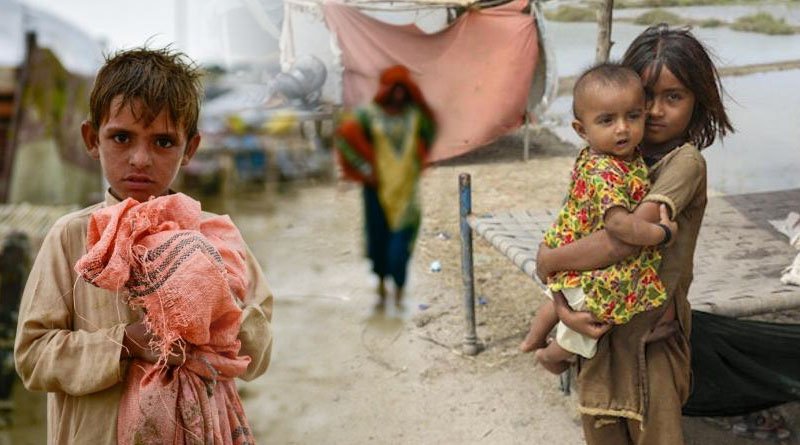Acute respiratory infections in children, a leading cause of child mortality worldwide, have increased dramatically in flood-affected areas.

The number of children identified as suffering from severe acute malnutrition in flood-affected areas monitored between July and December by UNICEF nearly doubled compared to 2021; an estimated 1.5 million children remain in need of lifesaving nutrition interventions.
Acute respiratory infections in children, a leading cause of child mortality worldwide, have increased dramatically in flood-affected areas.
In addition, more than four months after a national state of emergency was declared in Pakistan, up to 4 million children are still living near contaminated and stagnant flood waters, risking their survival and wellbeing, UNICEF warned today.
“Children in flood-affected areas of Pakistan have been pushed to the brink,” said Abdullah Fadil, UNICEF Representative in Pakistan. “While the rains have stopped, the crisis for children has not.” Nearly 10 million girls and boys continue to require immediate, lifesaving assistance as they face a harsh winter without adequate shelter.
“Severe acute malnutrition, respiratory and water-borne diseases, and the cold are endangering the lives of millions of children.”
Temperatures have dropped to 7 degrees Celsius at night in Jacobabad, a southern district where many families have little more than cloth to cover their makeshift shelters from stagnant floodwaters. Snow has fallen and temperatures have dropped below 0 degrees Celsius in mountainous and high-altitude areas affected by the floods.
UNICEF and its partners have begun to distribute items such as warm clothing kits, jackets, blankets, and quilts, with the goal of reaching nearly 200,000 children, women, and men.
More than 800,000 children have been screened for malnutrition in response to the worsening child survival crisis; 60,000 were identified as having severely acute malnutrition—a life-threatening condition in which children are too thin for their height—and referred for treatment with ready-to-use therapeutic food (RUTF).
So far, UNICEF health interventions have reached nearly 1.5 million people with primary health care services, and 4.5 million children in 16 flood-affected districts have been immunised against polio.
UNICEF and its partners have also given over one million people access to safe drinking water and one million hygiene kits. In the months ahead, UNICEF will continue to respond to urgent humanitarian needs while also restoring and rehabilitating existing health, water, sanitation, and education facilities for families returning home.
“As families return to their villages, our response has moved with them,” Fadil explained. “Our mobile health, nutrition, and water teams continue to respond to immediate lifesaving needs, while we help restore and rehabilitate existing health, water, sanitation, and education facilities, supporting the government’s efforts in climate-resilient recovery and reconstruction.”
“We know that the climate crisis played a significant role in escalating calamities in Pakistan. We must do everything in our power to ensure that girls and boys in Pakistan recover fully from the current disaster and are protected and safeguarded from the next.”
To provide immediate life-saving assistance, UNICEF is urging the international community to provide additional humanitarian assistance and ensure the timely release of funding to save lives before it is too late.
As the world looks to recovery and rebuilding, UNICEF urges countries to prioritise both the immediate and long-term needs of children by providing principled, sustained, and flexible assistance that is needs-based and allows for a response and recovery that moves with children as they return home, while also building and strengthening climate-resilient infrastructure and services that can reach children and families in need with healthcare, nutrition, learning, and other services.
UNICEF Pakistan has permanent field offices in all four provinces and four hubs to bring UNICEF operations and programmes closer to the most severely affected areas.
We have been collaborating with the Government of Pakistan, UN agencies, and non-governmental organisations (NGOs) to meet the needs of the most vulnerable populations in 55 calamity-affected districts, both for displaced populations and those returning to the location of their destroyed villages.
UNICEF’s current appeal of US$173.5 million to provide life-saving assistance to flood-affected women and children is only 37% funded.